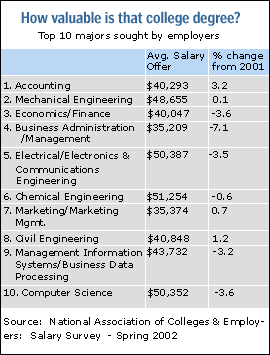
NEW YORK (CNN/Money) -
You don't need an economics degree to know that the job market has cooled. Pink slips have been flying and employers say they plan to hire 20 percent fewer grads this year than last.
Still, there are thousands of college seniors this spring whose biggest worries are which job offer to accept. Oh, and how high they can push their starting salaries.
What's their secret?
They have particular skills or academic degrees that are especially attractive to a handful of professions in need of new talent, said John Challenger, chief executive officer of the outplacement firm Challenger, Gray and Christmas.
Where the jobs are
"Healthcare is hot. Another area is mortgage banking -- that whole nexus around residential home sales. [Aerospace] defense and security [fields] are strong -- things like engineering," said Challenger.

Challenger's perceptions mesh with a recent employment poll conducted by the National Association of Colleges & Employees, which found the most sought-after grads this spring are those who majored in accounting, mechanical engineering and economics or finance.
"This is where we see the most demand time after time," said Camille Luckenbaugh, employment information manager at NACE. "Accounting, for example. Everybody needs accountants. Engineers, too. They're very versatile. If you're a chemical engineer, the majority of jobs will be in process engineering, but you could go into research and development or field engineering."
Some hot jobs come in cycles
Still, it would be a mistake not to acknowledge that cyclical trends do influence the labor market -- and the degree to which graduates have to struggle for work.
Internet technology grads -- who were feted and fussed over in recent years -- are having to work much harder to get work. The most sought-after IT grads are trained in information security -- another profession where new grads are in demand.
That's the case at MITRE Corp. in Bedford, Mass.
The non-profit company does high-level technical research and development work for the Department of Defense, the Federal Aviation Administration and the Internal Revenue Service. MITRE typically visits about 10 to 12 campuses each year to find students who are majoring in such fields as electrical engineering and information technology. The company also has a co-op program that hires roughly 25 college students, who work during summer or winter holidays when school's out.
MITRE still intends on visiting campuses this year and hiring students in its co-op program, but it doesn't have as many openings as years past, said Carolyn Brownawell, executive director human resources. The reason?
Older workers are wary about retiring in this economy. That means fewer opportunities for fresh wage-earners.
"There's much slower attrition," said Brownawell. "We're not seeing people leave, so we're doing limited hiring."
Professions with big gaps
Nevertheless, some professions have huge personnel shortages to make up for, and grads will find it a snap to get the job of their dreams.
These days, for example, aging Baby Boomers are driving big hiring demands throughout the health-care industry, which is looking for staff as medical researchers, home health aides and registered nurses.
In fact, by 2010 the country will need an additional 1 million nurses, and the number of students in nursing programs is expected to fall far short of that target, according to the American Association of Colleges of Nursing.
That means health-care facilities are competing hard to attract job candidates fresh out of school. On average, experienced registered nurses make $46,700 nationwide. Nurse practitioners with master's degrees earn more -- typically $63,170. But salaries may be padded with other perks.
"It's not uncommon lately to see signing bonuses of $5,000 at different hospitals and health facilities because of the shortage. I've seen them as high as $12,000," said Robert Rosseter, spokesman for AACN.
The Internet also remains an important recruiting tool. This week, for example, a new site -- Nursedaily.com -- launched so hospitals can advertise jobs nationwide and attract new nurses.
This kind of outreach has made it a snap for new nurses like Whitney Walker to find work. Walker graduated from the University of Vermont School of Nursing last spring with six job offers -- including one from the University of Vermont that guarantees her a job any time in the next three years.
But Walker decided to work for Vermont's "Healthy Babies" program, where she travels to parents' homes to check up on their infants and children and offer health tips.
"I got a dream job," said Walker. "I love moms and babies."
Starting pay drops -- even for the popular
One big change of late is starting salaries. They're simply not accelerating as they did in the 1990's. In fact, students in hot fields may even find that they're getting offers that are less generous than their peers in years past.
For example, computer science majors this year command a starting salary of $50,352 -- a drop of nearly 4 percent from 2001. Business students' starting pay has declined just over 7 percent.
"In the past few years, we were seeing increases of 10 and 12 percent. The salaries really skyrocketed. It was really crazy," said Luckenbaugh. "Now employers are looking for ways to cut back, although they're still very good starting salaries.
There also are jobs that have never paid record-breaking salaries. First-year teachers now earn an average of $35,000 a year -- far below many starting salaries in other fields. Still, school districts are scrambling to hire. According to the U.S. Department of Education, public schools must hire 2.2 million teachers over the next decade, adding an extra element of job security to education majors just leaving college.
"Qualified candidates can find jobs," confirmed Jon Snyder, dean of the graduate school at Bank Street College of Education in New York City. But he adds, some teaching positions remain tougher to get.
| |
 RELATED STORIES
RELATED STORIES
| |
| | |
| | |
|
"Graduates can get jobs in remote rural areas, in city schools with difficult working conditions, anybody in math and science, anyone willing to teach special education or bilingual education can get a job yesterday," Snyder said. "But if you want a job in wealthy, suburban districts, it will be more difficult."
No one knows this better than Tom Bock, superintendent of the 500-student, Chenoa School District. Located in the midst of farms in central Illinois, the school system has a hard time recruiting new teachers. In fact, last year Chenoa was hit hard when roughly one-third of the community's 50 teachers left to work at a rival district that could afford to offer bigger salaries. "In some cases, we only had one applicant for a position," said Bock.
Planning a career at college
While some jobs -- like teaching -- may fall in and out of favor, experts say students should not pick a degree based on what's hot today. Instead they should focus on what they're good at and what they enjoy.
"You certainly can't look at a list and think, 'I'll go for that,'" said Luckenbaugh.
In fact, it may be better to get a second degree after working. Employees with higher degrees generally earn more than their peers without as much schooling. But there are drawbacks associated with quitting work to go back to school, beyond just the tuition fee. There's the opportunity cost of missed promotions and lost retirement savings. For more about the advantages and pitfalls of returning to school, read "The cost of a higher degree."

|

